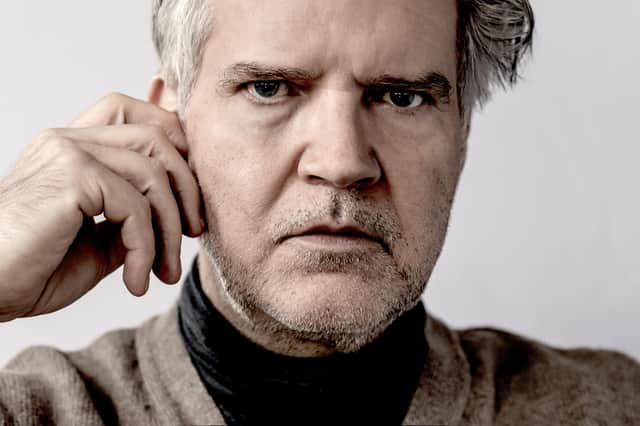Album reviews: Lloyd Cole | Sigur Rós | Grian Chatten | Martha Ffion


Lloyd Cole: On Pain (Earmusic) ****
Sigur Rós: ÁTTA (BMG) ***
Grian Chatten: Chaos For the Fly (Partisan Records) ****
Martha Ffion: The Wringer (Lost Map) ****
Lloyd Cole has always carried himself with style. In the mid-Eighties heyday of the Commotions, he might have accessorised self-consciously with a trendy paperback. Now in his early sixties, he wears it all easily – the writing skills, the cultural references and the ready use of electronica. He even autotunes those distinctive vocals at one point on latest album On Pain.
Despite co-writing half the album with his fellow Commotions Neil Clark and Blair Cowan (who will play live with him later this year), there is no concession to musical nostalgia. If anything Cole sounds younger, less encumbered than before on the title track, as he adopts a philosophical approach to relationships over a gentle, twinkling electronica backdrop.
Advertisement
Hide AdAdvertisement
Hide AdThat old transatlantic drawl radiates from Warm By the Fire, as he yearns for the classy and seedy contrasts of Los Angeles against burnished guitars and Eighties synth lines. More Of What You Are could almost be a Duran Duran video with its keen portrait of one of the beautiful people gliding through New York, supported by a backing choir including Joan As Policewoman.


Next, he jets musically to Dusseldorf with the Kraftwerkian I Can Hear Everything and then on to Berlin (“LA is so 1975”) to reference Bowie and Iggy on The Idiot (wistful like Bowie’s own Where Are We Now?) and deploy some Low-like synthesizer and elegant guitar distortion on You Are Here Now.
All is tastefully constructed with plenty of space for contemplation. This Can’t Be Happening is a cleansing synth haiku, repeated like a mantra, while the closing quiet epic Wolves exhales on a soothing, sighing refrain between its sage verses.
Enigmatic Icelanders Sigur Rós have returned unexpectedly with their first new album in ten years. ÁTTA reflects the line-up changes in that time – drummer Orri Páll Dýrason departed in 2018 while multi-instrumentalist Kjartan Sveinsson rejoins singer Jónsi and bassist George Holm after an 11-year hiatus to participate in this healing hymn of an album which dispenses with drums to major on sweeping synth soundscapes and tremulous strings performed by the London Contemporary Orchestra. Despite the lack of their signature volcanic eruptions, there is a sense of scale in the gentle calm, with Jónsi’s voice manipulated from pitch-shifted chipmunk tones to fragile, unadorned folk troubadour to multi-tracked angelic chorale.
Fontaines D.C. frontman Grian Chatten dials down the stridency and intensity on his debut solo album, though there is still a latent anger simmering through Chaos For The Fly, a loose collection of stories from a small seaside town. Bob’s Casino has an end-of-the-pier feel with its Seventies muzak strings and easy listening brass evoking saturated Super 8 footage of a sad, lonely life.


Like his band, Chatten flouts musical expectations – one minute he is practically crooning a chamber indie pop tune, the next delivering a poetic sketch in a disaffected drone, the next again pouring out disgust and disillusionment with softly expressed menace.
The folk fiddle and rockabilly rhythm of Fairlies is hard to resist, as is the Celtic waltz Salt Throwers Off A Truck, with Chatten utterly focused on his story of a freezing New York winter where “the whole of the city was seasoned to taste”.
Advertisement
Hide AdAdvertisement
Hide AdGlasgow-based Irish singer/songwriter Martha Ffion charms over a trim half hour on her third album, sounding like a one-woman Boygenius on the title track and a grunged-up Carole King on Fool’s Gold. She sustains the bittersweet country pop vibe on What They Said About You, adds delicate jazz-toned guitar twang on Chances and manages to make drunken, late night waltzing in the streets sound relatively decorous on closing track Taxi.
CLASSICAL
Guacamaya: Songs & Chamber Music from Mexico (Delphian) ****
If popular songs from Mexico are familiar enough, chamber music probably isn’t. But there are few better ensembles equipped to rectify that – think of their entertaining track record in spotlighting Argentine tango – than Mr McFall’s Chamber, and here they team up with versatile tenor Jamie MacDougall for a warmhearted album that exquisitely marries the two. MacDougall’s penchant for the vocal numbers comes from having a Mexican wife, and a custom, when performing there, to include indigenous songs as encores. He opens with Maria Grever’s smoochy Cuando vuelva a tu lado and hits the heights with Agustín Lara’s famous Granada and flirtatious Arráncame la vida. Twentieth century chamber music by the likes of Ponce, Moncayo and Revueltas provide refreshing and varied contrast. Sentimentality goes into overdrive for Ponce’s Estrellita, a salon-style sign-off ripened by MacDougall’s ecstatic vocals and cellist Su-a Lee’s solo transfer to quivering musical saw. Ken Walton
FOLK
Joe Miller with Any Geddes, Robyn Stapleton, Neil and Steve Sutcliffe: A’ the Way to Galloway (Own Label) ****
Singer, fiddler and scholar Jo Miller leads this splendid and diligently researched celebration of the underappreciated traditional music of her native Galloway, in the company of husband Steve Sutcliffe on concertina, son Neil Sutcliffe on piano and accordion, fiddler Amy Geddes and singer Robyn Stapleton. Miller sings with clarity and poise, as in The Hills o Gallowa and Toon o Dalry, the latter’s droll evocation of a local fair supported by wheezing concertinas. Striking a cappella moments include Miller and Stapleton’s keen harmonies in Gallowa Hills, an apposite mother and son duet in the ballad Lord Ranald and a setting of the poem Seasons, Miller singing William Neill’s eloquent Scots over vocal drones. Instrumentals include Neil’s winsome air, Kathleen, and a rollicking Polka Mazurka emerging from an archive recording made in a highly convivial kitchen.
Jim Gilchrist